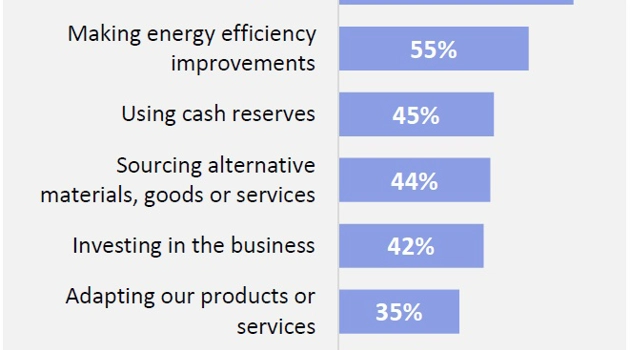Renewable energy firm ENERCON welcomed to Wick Business Park
Highlands and Islands Enterprise (HIE) developed the units in response to local demand.
Make your life easier with a MyHIE account. It’ll save you time, help you find and organise content based on your needs and interests.


The vast majority of businesses in the Highlands and Islands have been taking action to support their employees in response to the cost crisis.
This is according to Scotland’s latest Rural Business Survey commissioned by Highlands and Islands Enterprise (HIE), South of Scotland Enterprise, and the Scottish Government.
More than a thousand Highlands and Islands businesses responded to the survey. It was carried out between 5 October and 30 November 2022. At the time, the UK was entering a recession and experiencing increased inflation and a cost-of-living crisis.
The study also coincided with the UK Government’s mini budget announcement and subsequent Autumn Statement, which signalled higher taxes and likely spending cuts.
All of this was amid the ongoing Russia-Ukraine conflict, residual impacts of the pandemic, and industrial action across the UK.
As well as tracking business confidence, performance, optimism, and viability, the survey sought to understand the nature, extent and impact of rising costs and the ability of businesses to plan in the current economic climate.
It also explored financial concerns, including access to finance, and looked at the wellbeing of business leaders and staff.
A report of the findings for the Highlands and Islands showed that 82% of the region’s employers have been taking action to support their employees in response to the cost crisis.
More than half were engaging with colleagues to understand their needs (64%), increasing wages (51%), and encouraging flexible working (50%).
However, most (79%) of business owners and senior managers also reported impacts on their own wellbeing. More than half (56%) said these impacts included feeling worried or stressed, 49% were working longer hours and 45% were struggling to balance work and home life.
Business confidence continued to decline, with 41% expressing confidence in the economic outlook for Scotland (down from 49% in the previous wave and 60% prior to that).
However, confidence levels were still higher in the region than those expressed by businesses elsewhere in rural Scotland.
Highlands and Islands businesses were also more confident in their own prospects, with most (85%) very (38%) or fairly (47%) confident in their viability over the next six months.
Almost two-thirds of those expected to be operating at (50%) or above (13%) the same level in six months’ time.
Virtually all businesses (99%) had experienced cost increases in the past year. These were most notably in relation to raw materials (82% at least reported a slight increase and 56% reported a substantial increase), electricity and gas (81% slight and 55% a substantial increase) and transportation of goods (77% slight and 45% a substantial increase).
Most businesses were absorbing costs (70%), increasing prices (68%) or making energy efficiency improvements (55%).
Those that had performed well were more likely to have increased prices (72%) or invested in the business (46%), while those that had struggled were more likely to have scaled back.
Two in three businesses said they were currently unable to plan more than six months ahead, and 75% had postponed plans because of the cost increases.
Martin Johnson, HIE’s director of strategy and regional economy, said:
“This survey was carried out at one of the hardest times we’ve seen for businesses. It was on the back of many challenges, not least Brexit, the pandemic, and in the context of others such as the cost crisis, high inflation, and recruitment issues.
“The feedback shows many of the real impacts all of this has been having, not just on our region’s businesses but on the people involved in those businesses, and how they have been adapting. It’s very encouraging, for example, to see so many adopting fair work principles to support their employees and applying innovation to fine tune their operations and navigate the most trying of circumstances.
“As always, we’re grateful to all those who took part in the survey and provided such valuable insight. We will be sharing the findings with our partners and stakeholders and using them to inform our approach to providing business support.
“In the meantime, we’d welcome approaches from businesses looking for innovation support; whether that’s to develop a new product or simply to change their way of doing things, to help them maintain or improve their competitiveness.
“We’re also keen to hear from those who want to become fair work employers. For this we offer support packages for social enterprises in any sector, and to SMEs working in creative industries, food and drink or tourism.”
Highlands and Islands Enterprise (HIE) developed the units in response to local demand.
HIE will manage the fund on behalf of Scottish Government
Businesses in the Highlands and Islands are invited to apply to the 2025/26 Scottish Rural Leadership Programme.
The Scottish Government has begun recruitment to appoint a new Chair for the Board of development agency Highlands and Islands Enterprise (HIE).
Tha Riaghaltas na h-Alba air tòiseachadh a’ trusadh gus Cathraiche ùr fhastadh chun a’ Bhùird aig a’ bhuidheann leasachaidh Iomairt na Gàidhealtachd ’s nan Eilean (HIE).
HIE’s application is for permission to establish infrastructure, such as roads and utilities, to create serviced plots for sale to developers.
There’s a focus on renewable energy and the need to maximise economic and community benefits while driving the transition to net zero.
The move will help facilitate the company’s further growth. Its corporate and compliance team of ten will relocate to Aurora House, with the company’s operational base remaining in Beauly.
Project will help support economic growth and strengthen population retention in Caithness
There were 1,013 responses received from enterprises across the Highlands and Islands region operating in a wide range of sectors.